AS Yilma Belachew gazed upon memorial stones honoring fallen Ethiopian comrades, his memories drifted back to bodies rolling down a hillside in Korea, where he fought alongside U.S. Soldiers.
Belachew, then a 20-year-old captain with the Kagnew Battalion, was among United Nations troops who fought communist forces on the Korean peninsula. This year marks the 60th anniversary of the start of that conflict.
"We went with Americans to the front line and fought together," Belachew said. "From that, we helped a great nation, Korea, to survive."
Minutes earlier, Belachew welcomed U.S. Army Africa officers to the Ethiopians' Korea War Veterans Association museum and memorial, tucked within a park in Addis Ababa, the Ethiopian capital. It was the first time he'd seen U.S. troops in six decades.
At 79, Belachew's eyesight is failing, yet his memories are sharp. He pointed to a large battle map on the museum wall as he told his story. "I can see all the events in Korea," Belachew said. "I see everything clearly."
In June 1950, when the Korean War began, the U.N. built a coalition to fight against communist North Korean and Chinese forces. Haile Selassie, then emperor of Ethiopia, formed the Kagnew Battalions from his personal bodyguards, Belachew said. During the war, three Kagnew battalions served in Korea. Another arrived following the cessation of hostilities.
Ethiopian troops sailed from Djibouti, training shipboard during the three-week journey. At Pusan, they were attached to the U.S. 7th Infantry, working with the 32nd Infantry Regiment. Then they marched into combat, fighting alongside American Soldiers, Belachew said.
"When we were in the frontline. I admired the American Army. They were very good Soldiers," Belachew said. "When they fight, they fight. When they enjoy, they enjoy. I liked that."
Belachew fondly remembers patrols when U.S. Soldiers brought dogs along. Other times, he and his fellow Ethiopians relied upon U.S. tactics during operations, he said.
"When you went on patrol, you depended on (U.S.) support for artillery and air support," Belachew said.
Embedded in Belachew's memories-weeks of fierce combat in late-1952, when U.N. forces came to death grips with the enemy on the steep slopes of Triangle Hill during Operation Showdown.
"The longest fight I saw was Triangle Hill, almost a month we were fighting on that one, you could see bodies rolling down to the bottom," Belachew said. "A great fight was done there. We fought continuously day and night."
One day during battle, a battalion operations officer visited Belachew, who was commanding a 75-mm recoilless rifle team, to discuss division orders to muster an ambush patrol. A platoon leader fell ill and Belachew was asked to lead the Kagnew patrol into enemy territory, he said.
"So, I took 14 men with me and fought. I was successful," Belachew said. "I met the Chinese and fought them without any of my Soldiers wounded. We brought one body with weapons back to our front line."
In 1952, 21-year-old Melesse Tessema shipped out for a year-long combat tour in Korea. Six decades have passed and the names of Americans that Tessema served with are lost. But memories of comradeship remain.
"The American battalion was very brave," Tessema said. "I admired them."
During the fighting, 122 Ethiopian troops were killed, 526 were wounded, said Tessema, who now serves as chairman of the Ethiopian Korean War Veterans Association.
"We knew there was going to be sacrifice. But this sacrifice was not for nothing. It was for peace and liberty," Tessema said. "My friends, they gave their lives for history and for the freedom of human beings."
Over the years, Tessema visited the States several times, where he has met U.S. veterans of Korea. Like many aging veterans of conflicts past, Tessema worries that the sacrifices his comrades made for liberty will be forgotten if the stories of their bravery are not brought into modern times.
"In America, young people are going to forget the Korean War, the same here in Ethiopia also," Tessema said. "That's why our association is established, to pass our story on to (the) next generation."
Ethiopia's contributions during the Korean War did not go unnoticed at the time. In December 1952, when then President-elect Dwight D. Eisenhower visited troops in Korea, an Ethiopian honor guard greeted him, Belachew said, recalling a Newsweek article printed later that described the Kagnew Battalion's parade at goose-step march. He also remembers a report in the Stars and Stripes newspaper.
In 1953, as U.N. and communist forces negotiated a cease fire, Ethiopian troops fought alongside U.S. troops during the battle for Pork Chop Hill, fighting later depicted in a 1959 film starring Gregory Peck.
Ethiopian soldiers serving in Korea among Western powers clung to words Haile Selassie uttered in 1936 to the League of Nations, appealing for support against a fascist invasion, "It is us today, it will be you tomorrow."
They served knowing that only coalitions supporting ideals of freedom and liberty could free oppressed countries, an idea that Belachew still holds dear.
"Korea was almost turned to ash at that time," Belachew said. "We can see now, by sacrifice of Koreans and soldiers from 16 nations that Korea exists."
Lt. Col. Randy Torno and his fellow American instructors/mentors at the Ethiopian Defense Command and Staff College listened to the veterans' stories.
The meeting began a friendship that will continue to grow, and Torno and his peers hope to offer vintage Korean War-era artifacts to the veterans to help them share their experiences with others.
Torno explained to the Ethiopian veterans that USARAF will continue to cultivate its partnership with the Ethiopian military, carried out in the spirit of the longstanding cooperation between Ethiopian and U.S. Soldiers.
"It's an honor to meet the men who fought alongside our Soldiers in Korea," Torno said. "Our discussions with the Korean War veterans will directly apply to the strategic coursework in the classroom."
Tessema, now 77, is glad to see a new friendship building with the American instructors, he said.
"When I see the faces of Americans, I feel them like they are members of my family," Tessema said. "For me, the presence of Americans here gives me happiness."
Through mentoring, the American officers are able to help their Ethiopian counterparts better understand modern military strategy, which might save lives and money, Belachew said.
"I'm glad that Americans have come to our country," Belachew said. "I hope they will do a lot and they can build another part of history."

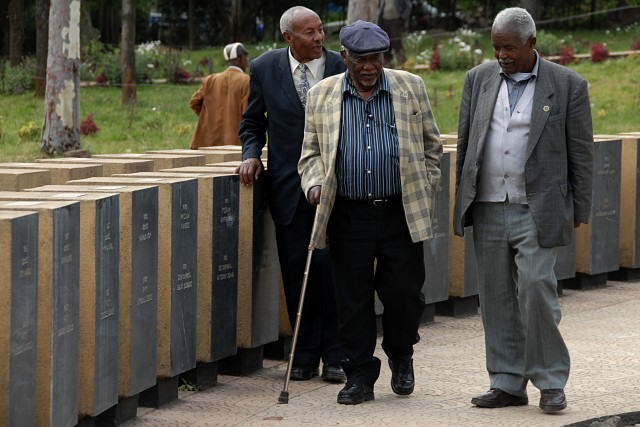


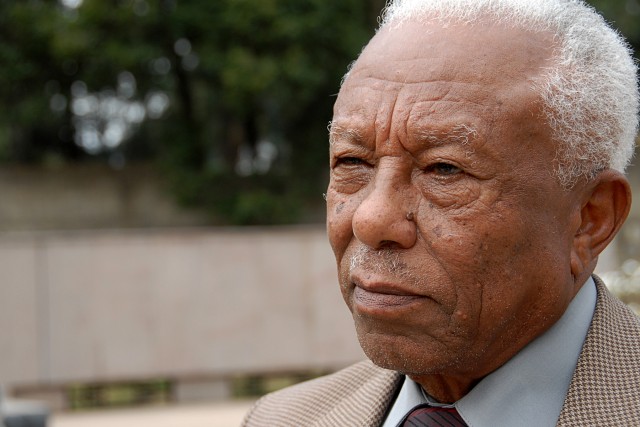
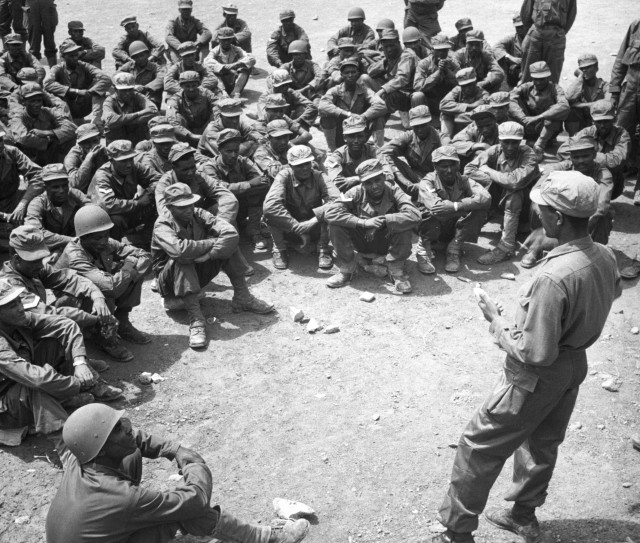
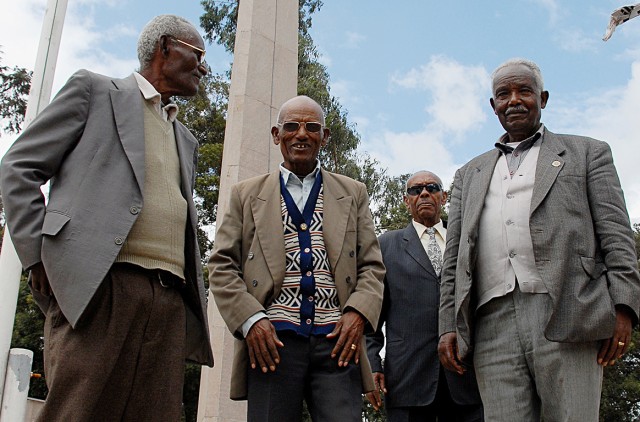






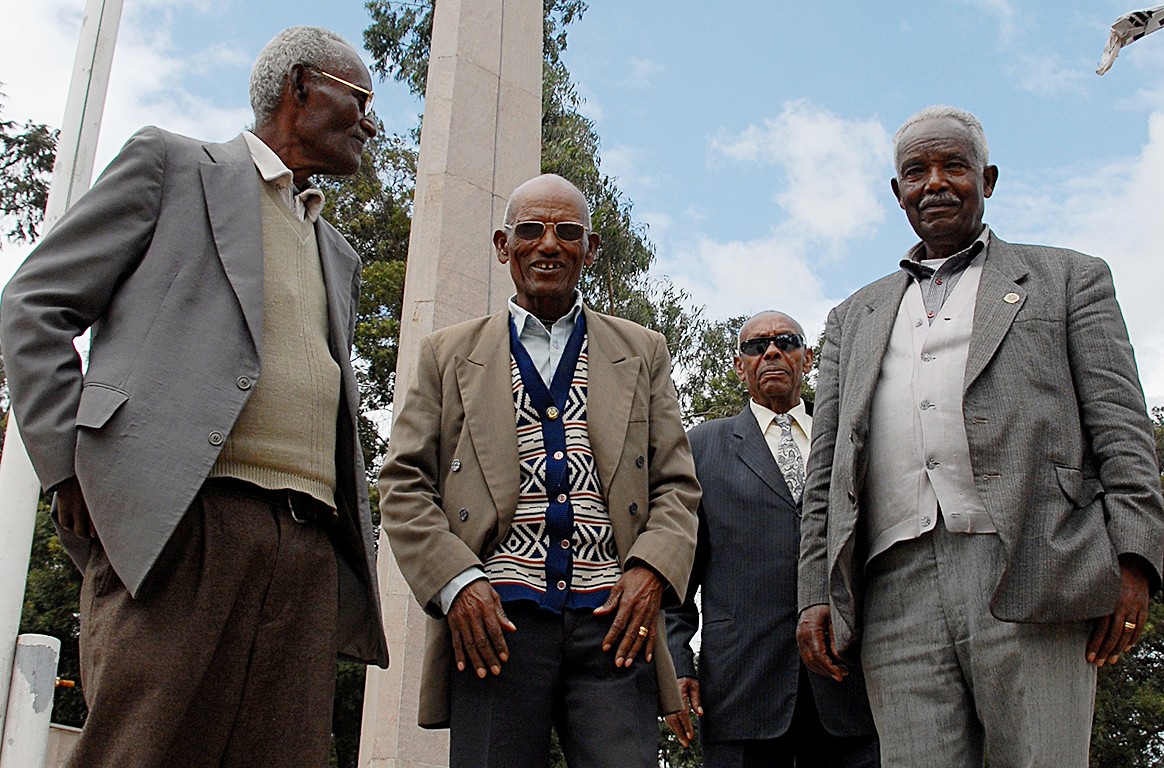
Social Sharing